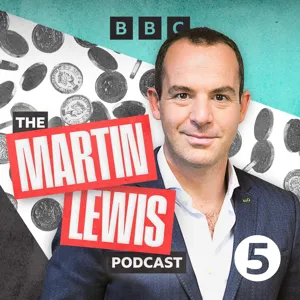Podcast Summary
Saving Money and Improving Health with PlushCare, UnitedHealthcare, and Martin Lewis: PlushCare offers online access to weight loss meds, UnitedHealthcare's short-term insurance is budget-friendly, Martin Lewis shares weekly money-saving tips, stoozing strategy requires financial savvy, and strategies for grandparents, boosting savings, and managing debt are discussed.
There are various ways to save money and improve your health. PlushCare offers online access to board-certified physicians who can prescribe weight loss medications for those who qualify, making it easier to start a weight loss journey. Meanwhile, UnitedHealthcare's short-term insurance plans provide flexible and budget-friendly coverage for those between jobs or starting a business. Martin Lewis's BBC Sounds podcast offers weekly tips on saving money, including an easy tip on switching bank accounts to earn extra cash. Stoozing, a strategy of borrowing money at 0% interest to save and make money, is back but requires financial savvy and a good credit score. Additionally, listeners can learn about strategies for grandparents, boosting savings, and managing debt.
Switching to a new bank account with incentives: Easily switch accounts with services like 7-day switching, receive incentives like £200 and 5% interest, and compare offers from various banks to find the best fit
Switching your bank account can be an easy and hassle-free process due to services like 7-day switching. This process includes automatically transferring your balance, standing orders, and direct debits to your new account. New customers opening a Nationwide Flex Direct account can receive a £200 incentive, along with 5% interest on up to £1500 for a year and a year's 0% overdraft. To be eligible for these perks, you typically need to meet a minimum monthly pay-in of £1,000. Banks like Nationwide, First Direct, NatWest Rewards, and RBS Reward offer such incentives to attract new customers. If you're considering a switch, it's worth comparing the offers from various banks to determine which one best suits your needs. Remember, if you're not satisfied with your current bank, especially if it has below-average customer service, you could potentially make £200 by switching.
Maximize banking benefits by moving accounts and opening cashback accounts: Individuals can earn switching bonuses by moving additional accounts to certain banks and maximize benefits by opening cashback accounts.
Customers with existing accounts at certain banks, such as Nationwide or TSB, can move an additional account to that bank to receive a switching bonus. This strategy, combined with opening a cashback account like Chase, allows individuals to maximize their banking benefits. In the mortgage market, uncertainty prevails due to withdrawn offers and rising interest rates. The decision to apply for a mortgage now depends on an individual's current mortgage rate and their comfort with potential future changes. Variable mortgage rates are directly linked to the Bank of England interest rate, so monitoring these rates is crucial when considering a mortgage application.
Divergence between fixed and variable mortgage rates: Individuals with financial flexibility may consider variable rates for potential savings, while those prioritizing security and stability should consider fixed rates based on their circumstances and risk tolerance.
The current economic climate is causing a significant divergence between fixed and variable mortgage rates. While fixed rates are based on swap rates and have historically been only slightly more expensive than variable rates, the recent surge in government bond yields has led to a larger gap. Some homeowners with the financial flexibility to take on variable rates may consider this a short-term opportunity, as they could potentially save money if rates decrease in the future. However, for those who prioritize security and stability, especially those close to their mortgage budget limits, it may be wiser to lock in a fixed rate. Ultimately, the decision between fixed and variable rates depends on individual circumstances and risk tolerance. It's important to remember that making the right decision doesn't guarantee a favorable outcome, but rather that the decision itself was sound. In finance, as in the coin toss example, outcomes can be unfortunate but not inherently wrong.
Mortgage ticking time bomb: Challenges for homeowners: Rising interest rates and affordability tests could limit homeowners' access to cheap mortgage rates, potentially worsened by a house price correction. Government intervention, such as mortgage payment holidays, changes to affordability rules, and stronger forbearance measures from lenders, may help mitigate these issues.
The current mortgage market could pose significant challenges for homeowners due to rising interest rates and affordability tests. This situation, referred to as the "mortgage ticking time bomb," could result in fewer people qualifying for the cheapest mortgage rates, forcing them to accept more expensive options. Additionally, a potential house price correction could worsen the situation for those with high loan-to-value ratios. To mitigate these issues, the speaker suggests government intervention, including mortgage payment holidays, changes to affordability rules, and stronger forbearance measures from lenders. For homeowners like Saskia in Bristol, who are facing an expiring mortgage and higher interest rates, it's crucial to be aware of these challenges and consider their options carefully.
Historically low mortgage rates may not return soon: Considering current rates, fixing mortgage for 4 years could be cost-effective despite potential rate drops or rises.
While it's natural to hope for lower mortgage rates in the future, historically low rates are an anomaly and it's plausible that they may not return for some time. A 4-year fixed rate mortgage at over 4.2% is currently much cheaper than what most applicants are offered today. While there's a risk of overpaying if rates drop, the bigger risk is being unable to afford higher mortgage payments if rates rise significantly. The decision to fix or not should depend on individual circumstances, worry levels about affordability, and the advice of mortgage experts. It's important to remember that nobody can predict the future of mortgage rates with certainty.
Consider switching to a larger energy supplier like Octopus Energy for potential cost savings: Evaluate energy usage patterns and appliances to determine if Octopus Energy's tariffs can result in significant savings, and consider time-of-use tariffs or solar panels for added benefits.
It's worth considering switching to a larger energy supplier like Octopus Energy for potential cost savings, despite the common advice to stay with more mainstream providers. Octopus is actually a massive company, and their tariffs, particularly their overnight rates, can result in significant savings for some consumers. However, it's essential to evaluate your energy usage patterns and appliances to determine if you can make the most of these tariffs. Additionally, while most people pay the same rate for energy usage regardless of the time, those on specific time-of-use tariffs or with solar panels can benefit from using energy during off-peak hours. The decision to switch should be based on careful consideration and personal circumstances. It's also crucial to remember that no energy supplier is completely risk-free, and extraordinary times like the current economic climate may pose risks to even the largest firms. Overall, the key takeaway is that it's important to explore all options and make informed decisions based on your unique situation.
Expert knowledge leads to financial gains: Identifying value in items and buying low to sell high can lead to significant profits. Expertise and effort are required, but potential rewards are substantial.
Having expert knowledge and the ability to identify value in items can lead to significant financial gains. Individuals like CJ, John Einstein Wood, and Frank in Leeds have used this skill to buy low and sell high on various platforms, such as Facebook Marketplace and eBay. For instance, CJ bought a tandem bike for £95 and sold it for £400, while Frank bought a BOSS office chair for £10 and sold it for over £350. This strategy, however, comes with the potential for tax implications once it becomes a consistent trade. Additionally, there are those who have found valuable items in unexpected places, such as charity shops or car boot sales, and sold them for substantial profits. For example, Deborah bought a book for £2 and sold it for £350 to a buyer in Japan. The key is to have a good understanding of the market value of items and the ability to restore or repair them to increase their worth. It's important to remember that this strategy requires a certain level of expertise and effort, but the potential rewards can be significant.
Understanding Energy Bills: A Light-Hearted Lesson: Being energy efficient can significantly reduce your energy bill, but remember to account for standing charges.
During their weekly segment, the host playfully quizzes a guest named Nihao about money saving, making light-hearted fun of his lack of knowledge in this area. Nihao has finally decided to embrace frugality and aims to reduce his home energy bill to zero, but he fails to consider the standing charge for accessing energy. The host asks Nihao what his energy bill would be if he used no gas or electricity at all, and presents him with three options: £73, £173, or £273 over the year. Nihao guesses £273, but the correct answer is less than a pound a day for each utility. This segment highlights the importance of understanding all components of one's energy bill and the benefits of being energy efficient.
Grandparents can get National Insurance credits for childcare: Grandparents caring for grandchildren can receive National Insurance credits, allowing parents to transfer their earned credits and boost their state pension.
Martin Lewis, the money saving expert, shared some valuable tips for listeners in his podcast. He discussed how grandparents who look after grandchildren while parents work can apply for a benefit called "specified adult childcare credit" or "grandparental childcare credit." This benefit allows parents to transfer National Insurance credits they earn from working to their grandparents, helping them reach the required number of years for a full state pension. This can result in an increased pension amount for grandparents. Additionally, Martin mentioned a new top easy access savings account from Santander, which is currently paying 2.75% variable interest on up to £250,000. Listeners should open this account by November 1st to take advantage of the high interest rate.
Open a savings account with £1, unlimited withdrawals, and £85,000 protection: Open savings accounts with minimal funds, unlimited withdrawals, and protection up to £85,000 per person per institution. Listen to the Martin Lewis podcast for financial insights, and consider flexible, budget-friendly health insurance or discounted travel essentials.
Individuals can open a savings account with as little as £1 and have unlimited withdrawals, with up to £85,000 per person per financial institution protected. This account can be opened online, in branch, or via app. With the increasing focus on personal finances due to media headlines, the Martin Lewis podcast provides insightful discussions on financial matters, featuring special guests and analysis of current events. Looking ahead, the need for health insurance remains constant, and UnitedHealthcare TriTerm medical plans offer flexible and budget-friendly coverage for those in between jobs or missed open enrollment periods. Lasting nearly 3 years in some states, these plans provide access to a nationwide network of doctors and hospitals. For travelers, Quinn's offers high-quality essentials at discounted prices, with a commitment to ethical manufacturing practices.




